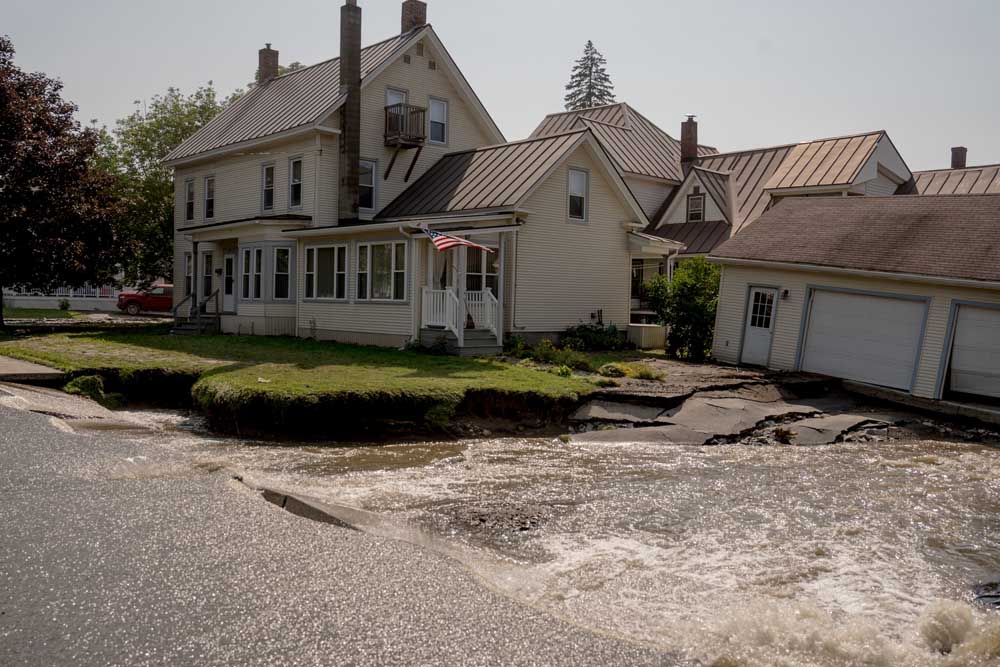Explainer: Why Vermont is picking a fight with Big Oil
Published 9:00 pm Saturday, June 15, 2024

- Homes throughout Barre, Vt., were left with thick mud and sediment after flash flooding in July 2023.
Nearly a year after catastrophic flooding struck Vermont, the city of Barre confronts the overwhelming task of steeling itself for the next climate disaster.
Two bridges need to be raised. Barre’s north end “literally needs to be rebuilt,” said Mayor Thom Lauzon, who was recently elected and now oversees the city’s recovery. Of the 300 properties damaged by the flooding, many are still in various states of disrepair, and at least 50 are uninhabitable.
Trending
Across the country, state and local leaders are scrambling to find the money they need to protect their communities from worsening disasters fueled by climate change. For Barre, needed flood mitigation projects will cost the city an estimated $30 million over the next five years, Lauzon said.
Yet Vermont has a new answer to this problem.
Earlier this month, it became the nation’s first state to require fossil fuel companies and other big emitters to pay for the climate-related damage their pollution has already caused statewide. While conservative legal experts are skeptical the law will survive challenges, some Vermonters said they are both grateful and a little nervous that one of the nation’s least populous states has picked a fight with one of America’s most powerful industries.
The Vermont law comes as oil and gas companies face dozens of climate lawsuits, both in the United States and abroad. While none of the state and local lawsuits have gone to trial yet — including Vermont’s own challenge, filed in 2021 — they pose a growing threat and add to the companies’ potential liabilities. If Vermont’s novel approach endures, it could reverberate across the industry.
Republicans are pushing back, arguing that individual states cannot apply their own laws to a global pollutant. Last month, Republican attorneys general in 19 states asked the Supreme Court to block the climate change lawsuits brought by California, Connecticut, Minnesota, New Jersey and Rhode Island against fossil fuel companies.
Vermont’s law authorizes the state to charge major polluters a fee for the share of greenhouse gas emissions they produced between 1995 and 2024. It is modeled on the 1980 federal Superfund law, which forces polluting companies to clean up toxic waste sites.
Trending
The law doesn’t spell out how much money should be paid; instead, it tasks the state treasurer with assessing the damage Vermont has suffered from climate change and what it will cost to prepare for future impacts. Bills similar to Vermont’s have been introduced in several states, including California, Maryland and Massachusetts. Last week, New York lawmakers passed a climate superfund law that would require polluters to pay $3 billion a year for 25 years. It is now awaiting Democratic Gov. Kathy Hochul’s signature.
Memories of last July’s flooding, which inundated the state capitol of Montpelier, damaged thousands of homes and trapped people in small mountain towns, are still fresh. Over the last year, Vermonters have also endured a freak late-spring frost that damaged crops, hazy skies from smoke blown south from hundreds of wildfires in Canada, and more flooding in mid-December. All these events primed state lawmakers to tackle climate change at the beginning of 2024.
As disaster recovery costs mount, it has not been lost on state leaders that oil companies are enjoying massive profits. In 2023, the warmest year on record, the two largest U.S. energy companies, ExxonMobil and Chevron, together made more than $57 billion.
It might seem unlikely for a state like Vermont, with a population just under 650,000, to stand up to the fossil fuel industry. The state’s Republican governor, Phil Scott, expressed skepticism in a letter to the secretary of the Vermont Senate, writing, “Taking on ‘Big Oil’ should not be taken lightly. And with just $600,000 appropriated by the Legislature to complete an analysis that will need to withstand intense legal scrutiny from a well-funded defense, we are not positioning ourselves for success.”
Ultimately, the governor allowed the law to go into effect without his signature, saying he understood “the desire to seek funding to mitigate the effects of climate change that has hurt our state in so many ways.”
Legal challenges will inevitably follow — the only question is when.








